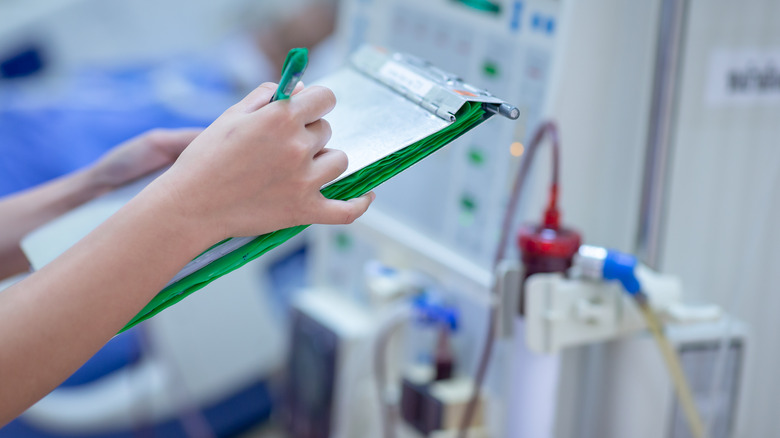Signs Your Twitching Muscle Is Actually Kidney Disease
A twitch in your muscle can mean any number of things. Perhaps you went too hard at the gym the other day with a high-intensity workout, you're experiencing a nervous tic, or you're dehydrated. Or maybe your muscle is spasming because of a nutrient deficiency.
But there are more serious reasons for twitching muscles — like chronic kidney disease, for instance. Chronic kidney disease, or CKD, is a long-term condition where your kidneys are unable to function as they should when it comes to removing excess fluid and waste from your body, resulting in high potassium and phosphorus levels in your system and a host of other complications like anemia, increased risk of infections, depression, and loss of appetite. An imbalance of the electrolytes calcium and phosphorus, for example, can lead to muscle cramping.
When your kidney function is severely affected by CKD, your muscles are impacted too. A buildup of metabolic waste in your system leads to damaged muscles and nerves and results in twitching, weakness, cramps, and pain in your muscles. Other symptoms include a prickly sensation on your skin, losing feeling in certain areas of the body, restless leg syndrome, lethargy, confusion, and seizures.
Other warning signs of chronic kidney disease
It is easy to confuse some of the symptoms of kidney disease with other conditions, according to experts. "[T]hose with kidney disease tend not to experience symptoms until the very late stages, when the kidneys are failing or when there are large amounts of protein in the urine. This is one of the reasons why only 10% of people with chronic kidney disease know that they have it," explained Chief Medical Officer at the National Kidney Foundation, Dr. Joseph Vassalotti.
Warning signs from your kidneys you shouldn't ignore include tiredness, weakness, fatigue, trouble sleeping, dry and itchy skin, feeling the urge to pee more often (especially at night), bloody urine, puffiness around your eyes, swollen ankles and feet, and muscle-related symptoms like what we discussed above.
Having a family history of chronic kidney disease and other underlying health concerns like high blood pressure, diabetes, obesity, and heart disease can put you at risk for developing CKD. In the U.S., around 37 million adults are thought to have CKD, per the Centers for Disease Control and Prevention. Keeping an eye out for risk factors and symptoms, including ones related to your muscles, will help you treat the disease with the help of lifestyle changes, medication, and sometimes surgery.
Diagnosing and treating chronic kidney disease
Diagnosing CKD involves blood and urine tests, along with ultrasound, MRI or CT scans, and a kidney biopsy. There is no cure for chronic kidney disease but lifestyle changes, along with medication, and sometimes dialysis can help manage the symptoms and improve your quality of life. Stage 5, the advanced stage of the disease, might require a kidney transplant.
Restricting your sodium intake, eating a healthy diet of limited protein and heart-healthy foods, paying attention to your phosphorus and potassium intake, quitting smoking, limiting alcohol consumption, maintaining a healthy weight, exercising regularly, and avoiding medications that could further damage your kidneys, like non-steroidal anti-inflammatory drugs (NSAIDs) can help when it comes to managing the disease.
As for the cramping in your muscles, gentle stretching, massages, a warm bath, wearing comfortable shoes, and adequate hydration could bring some relief. Muscle twitching and cramping can also occur during dialysis when fluid is rapidly being removed from your system or you experience low blood pressure, and this can be relieved by adjusting how you're positioned, stretching gently, reducing the rate of fluid removal, and administering regular saline. Speak with a healthcare provider if you experience muscle spasms during a dialysis session.
Pain, exhaustion, and hidden symptoms are all part of living with chronic kidney disease but with proper care and lifestyle changes, it is possible to live a long life with the condition. If you found this useful, you may want to read up on things you didn't realize were hurting your kidneys.



